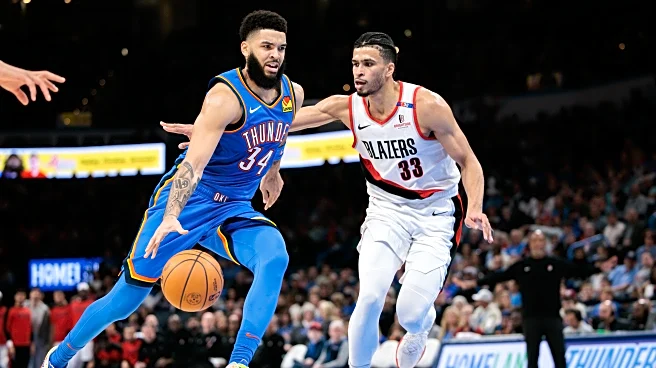The Portland Trail Blazers are about to enter the month of October. Training camp, preseason, and the start of the regular season are all commencing in the next few weeks. As they prepare to take the plunge,
we’ll examine a big-picture question submitted to the Blazer’s Edge Mailbag this week.
Dave,
I love the off season moves by [General Manager Joe] Cronin but on the level how well do you think we’ll do this year? It feels like the standard for success has moved finally. I don’t know if that’s a hope thing or if we’re just getting ready for another disappointing fall. I’d be interested in your take?
Carl
As with so many things surrounding the Blazers over the last few years, the answer depends on perspective.
I don’t think it’s hard to set an abstract standard for success in the NBA. Winning a championship is the ultimate achievement, the only pure and unblemished definition. Acknowledging that only 1 team in 30 can do that each year, higher-level playoffs participation–contending for a championship–is the closest goal beneath.
I’d say that any fan base with a team at or near the Conference Finals level should be pretty happy, with relatively few qualifications. Yes, a few one-timing strays will get in there. Conference Finals participation isn’t overwhelmingly difficult; it means winning two playoff series. But it’s still a mark of distinction.
Underneath those teams are general playoffs participants. Since 16 teams make the postseason, this should be the minimum qualification for success…literally the least you can do and still claim to be a good team. We can probably raise an eyebrow at 8th seeds who crow about themselves, but they’re near the top half of the league, so let’s give them a pass.
If you don’t make the playoffs–even if you participate in the Play-In Tournament–I have a hard time calling you a successful team. We can talk about growth, moving forward, future assets…there are plenty of ways to qualify the failure to make it look prettier, or at least temporary. But professional sports is a limited, competitive endeavor. Every team in the league is fighting for those 16 bracket spots. They don’t invent more just to make you feel good. You either do it or you don’t. If you don’t, nothing substitutes.
So now, the big question is whether, or how, those universal expectations should be modified for the Trail Blazers.
Despite everything I just said, for the last couple years we’ve had to slant the lens. After the Blazers deconstructed in 2022 and 2023, making the postseason just wasn’t realistic. If your child’s in kindergarten, expecting them to solve Algebra equations says more about you than them. Growth happens in steps. Success means completing them. That’s how we’ve measured in Portland since the start of this rebuild.
It’s no accident that, especially during critical times of transition over the past couple years, some readers have lobbed judgments like “pessimistic” or “optimistic dreamer” at some of the analysis I’ve given in mailbag responses like this. Most of the time, they’re not talking about an absolute standard. Under these conditions there aren’t any. Instead they’re critiquing how much we’ve adjusted our expectations away from the universal norms we discussed above. As soon as we drift away from them, the questions of, “How far?” and “In what ways?” take over the discussion. When perspectives vary, so does the analysis.
Starting the 2025-26 season we have to ask once again whether we should talk about the Blazers in the same way we speak of the other 29 teams in the NBA or whether special circumstances make it necessary to measure their success differently.
My opinion on the matter has changed this summer for a couple reasons.
First, the variance in perspective we just talked about opens the door to Blazer-centric bias. Altering the standards at all is inherently biased, of course. You’re making special provisions for your own team that you don’t accord to others. But as is typical among people with a vested interest, fans will hop to the side of the fence that favors their argument. When it’s convenient for the Blazers to be ranked objectively on a leaguewide standard, people will hop on that train. As soon as it’s not, they’ll start qualifying and saying the broader standard is the wrong measure. People start with the idea that good things should be said about their point of view and then find the metric to make it happen.
Normally that doesn’t bother me because, hey, that’s just sports talk, right? But this kind of thinking has overflowed its bounds into areas I care about very much like faith and politics and human rights…just about everything we do together as a society. The tsunami of self-interest is horrible to witness. It’s even scarier when you begin to suspect that people literally can’t tell the difference anymore between their self-interest and truth. As we watch this unfold, repeating it–even in the relatively unimportant sports world–seems correspondingly ickier. I don’t want to do it any more than I have to. Truth still matters, even here in this little corner of reality..
Second, and just as importantly, the Blazers themselves are telegraphing that they want to be taken seriously…that they intend to re-enter real competition instead of being regarded as “Good…for the Blazers.” Trading for Jrue Holiday’s long-term contract was a sign. So was inking Damian Lillard to a deal, in a slightly different way. Making adult-team (instead of just asset-based) decisions about Anfernee Simons and Deandre Ayton were also indications. So hey…if the Blazers are telling us they want to compete, take them at their word and judge them accordingly..
Note that this is quite different than saying they’ll succeed. They may not make the playoffs this year. But if they don’t, we should then be able to say that they did not accomplish the goal that they were aiming at, the one that real, live NBA teams are supposed to aim at. We can qualify and nuance, but if we’re talking success in bald terms, that’s it. They either make it or they don’t.
The journey of the last few years could almost be described as pilots in training backing up their plane from the gate, cruising the tarmac, and lining up on the runway. The Blazers have been doing all those things, learning more and more as they go. But this summer, for better or worse, they pushed the throttle forward, hit V1, and pulled back on the wheel. The plane is off the ground now. Given that, only one question matters: will it fly? Everything else is academic.
If it doesn’t, management will have to call in some mechanics, retool, and start again. If it does, well, it doesn’t matter how pretty it is at first as long as it stays airborne. Either way, the results should be obvious. They lie in those 16 postseason bracket spots. If Portland gains enough altitude to cruise at that level, they made it. If not, no further explanation is necessary.
How about you? What’s your definition of success for the Blazers this year? Share your thoughts in the comment section! And thanks, as always, for the question! You can always send yours to blazersub@gmail.com and we’ll try to answer as many as possible!









